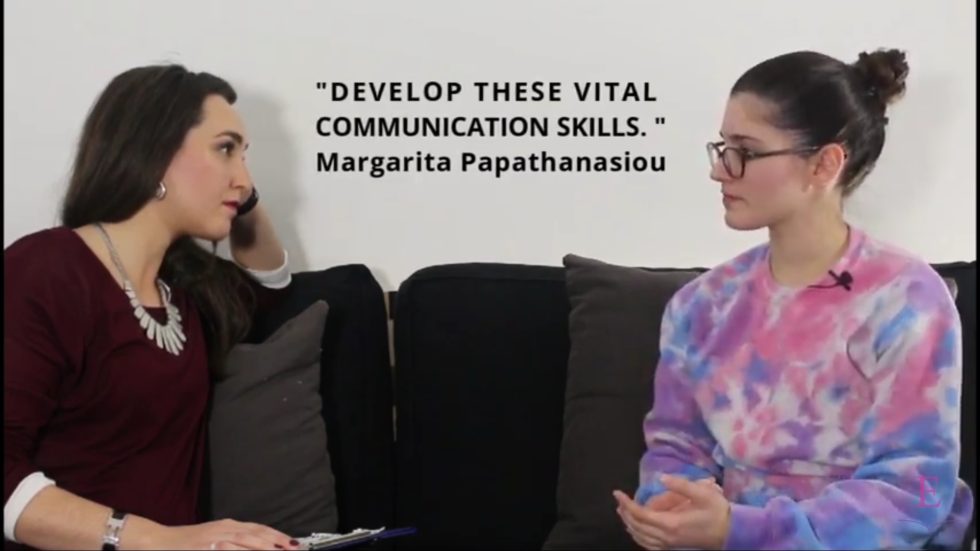
From The IB Bubble To The Real World
WHAT’S THE ISSUE? What do you do if you get into the uni of your dreams…only to discover that the course you chose isn’t the one for you? Margarita Papathanasiou shares helpful advice from her experience of having to have those difficult conversations with her parents, after she realized that she wanted to change from an Engineering degree to an Arts degree.
FROM AN ENGINEERING TO AN ARTS DEGREE
ELENI VARDAKI: Hi, and welcome to my channel, where I talk to successful IB graduates about their experience of university and the IB diploma. Today I’m talking with Margarita Papathansiou. Would you like to talk a bit about that transition, and how you decided to go from an Engineer degree to an Arts degree?
MARGARITA PAPATHANSIOU: When I chose my IB subject I wasn’t very clear about what I wanted to do when I would get into uni. So I decided to get the more scientific subjects. I did the whole IB.
When I got into uni, I discovered that I didn’t like it so I had to change it, otherwise I would have spent four or five years in uni doing something that I wasn’t fond of.
In the beginning of the second semester, I had many appointments with my Personal Tutor, so I could discuss with him why I wasn’t satisfied with my degree. And I decided to change the whole thing, because when you go to lectures, to tutorials – or even when you talk with your peers around you, you don’t have that feeling of satisfaction there is something that’s missing, there is no feeling of fulfillment.
It took me a lot of time to discuss with my parents, which was not a huge conflict but let’s say a clash of interests, because no parent on this planet has bad intentions for his or her child. But, how do I say it…like a gap of generations. Especially if you change from a degree which guarantees that you are going to have a fixed salary, compared to a degree where you don’t know if you are going to make it after four or five years. Because let’s be realistic, when you choose an Arts degree, depending on the nature of the degree, you are going to need a supportive environment and sometimes some connections which are going to help you get into the small community in order to start your career.
WHAT'S THE DIFFERENCE?
MARGARITA PAPATHANASIOU: Engineer is more self-centered, because you have to do many tutorials, and you have to isolate yourself in order to evaluate what you’ve learned from lecturers and repeat the exercise. Until you finally have understood what you were taught, let’s say, three hours in the lecture theater.
And although Art seems self-centered, it depends on the art degree. For example, if you go, let’s say, to the more practical arts, you’re going to figure it out that you have to get in a group project, and you have to be surrounded by many people. Otherwise you can’t make the whole project by yourself.
For example, if you choose Fine Arts, then you’ll have to spend many hours by yourself. But if you choose Fashion, Game Design or Film, for example, you have to get into group project and each person should know their role and get together and do the whole project together.
If you go for Engineering, you are going to have more chances in employment, which is true, and you might earn a bigger salary in 10 years’ time. But I think it’s all relative. For example you might get into an Arts degree and you have to go into the actual business, it’s going to take you a lot of time until you get an established salary, which happens in the Engineering degrees as well. You have to do a lot of dirty work until you get established.
IB DIPLOMA SKILLS VS REAL WORLD SKILLS
ELENI VARDAKI: So when we were planning this video and we were talking about what it is that you wanted to talk about, and I asked you what you thought the title of the video could you be, you were very clear in your answe. You said you wanted it to be, “From the IB Bubble to the Real World”. Why that title? Do you want to talk a bit about that?
MARGARITA PAPATHANSIOU: So I believe that the IB does train you so you can get fully prepared for university, but I still believe it’s a kind of bubble. Because although the IB says we want to make the world a better place, it does force you to take a lot of subjects. For example, when you have 2 Higher Level subjects and you have you’re CAS and TOK, and you want to have so many extracurricular times, I mean let’s face it – a day has 24 hours. So there is no time to do it all.
And I think the IB focuses on the individual. One thing that would be good for improving, let’s say the IB, is to get people together and do many group projects. Because this is when you learn about keeping a balance within your peers.
Sometimes, we all know that in a group, someone is doing all of the whole work and someone is quite lazy. And you have to learn how to speak up for yourself. Like, let’s say, “This person wasn’t collaborative”, or “That he was a pain for the whole group”. People are going to hold grudges against you, but that’s their insecurities. That’s bad news for them, not for you. When you know when to stand up for yourself – this is something that the IB should take consideration of.
I would like to say that the IB is not the end of the world.
You get excited when you get into the uni of your dreams, but if you want to change your degree and you don’t know how to start, vocalize it and don’t keep it inside. If you want to change something, do it. Don’t wait in your corner and wait after four or five years and say, “I am going to do what I want to do in my Master’s degree” – that’s crap. Let’s start with this one.
And I wanted to say that it should be good if you get used more real life skills, because okay, you do have your mainstream education skills from the IB, but you are not going to be taught everything, and you have to find it by yourself. Get with people around you and develop these vital communication skills.



